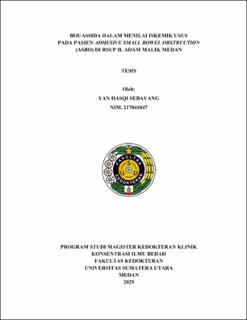| dc.description.abstract | Introduction: Adhesive small bowel obstruction (ASBO) is a common surgical emergency, with intestinal ischemia being a serious complication requiring prompt intervention. The Bouassida score is a clinical-radiological tool developed to predict intestinal ischemia in ASBO patients. This study aims to analyze the role of the Bouassida scoring system in predicting intestinal ischemia among ASBO patients at Haji Adam Malik General Hospital Medan.
Methods: A cross-sectional analytical study was conducted at RSUP H. Adam Malik Medan. The study included all patients diagnosed with ASBO during the study period. Data were collected retrospectively from medical records, including demographic characteristics, clinical features, Bouassida scores, and intraoperative findings. The association between Bouassida scores and the incidence of intestinal ischemia was analyzed statistically.
Results: A total of 40 patients with ASBO were included, consisting of 24 males (60%) and 16 females (40%), with a mean age of 47.3 ± 12.5 years. Most patients had a history of previous abdominal surgery (92.5%). Based on the Bouassida score, 18 patients (45%) were classified as high risk for intestinal ischemia (score ≥4), while 22 patients (55%) were low risk (score <4). Intestinal ischemia was confirmed intraoperatively in 15 patients (37.5%). Among high-risk patients, 12 (66.7%) were found to have intestinal ischemia, compared to only 3 (13.6%) in the low-risk group. Statistical analysis showed a significant association between higher Bouassida scores and the occurrence of intestinal ischemia (p < 0.001). The sensitivity and specificity of the Bouassida score (cut-off ≥4) for predicting intestinal ischemia were 80% and 85%, respectively.
Conclusion: The Bouassida scoring system is a valuable predictor for intestinal ischemia in patients with adhesive small bowel obstruction at RSUP H. Adam Malik Medan. Its use can assist clinicians in early identification of high-risk patients, facilitate timely surgical intervention, and potentially improve patient outcomes. | en_US |


